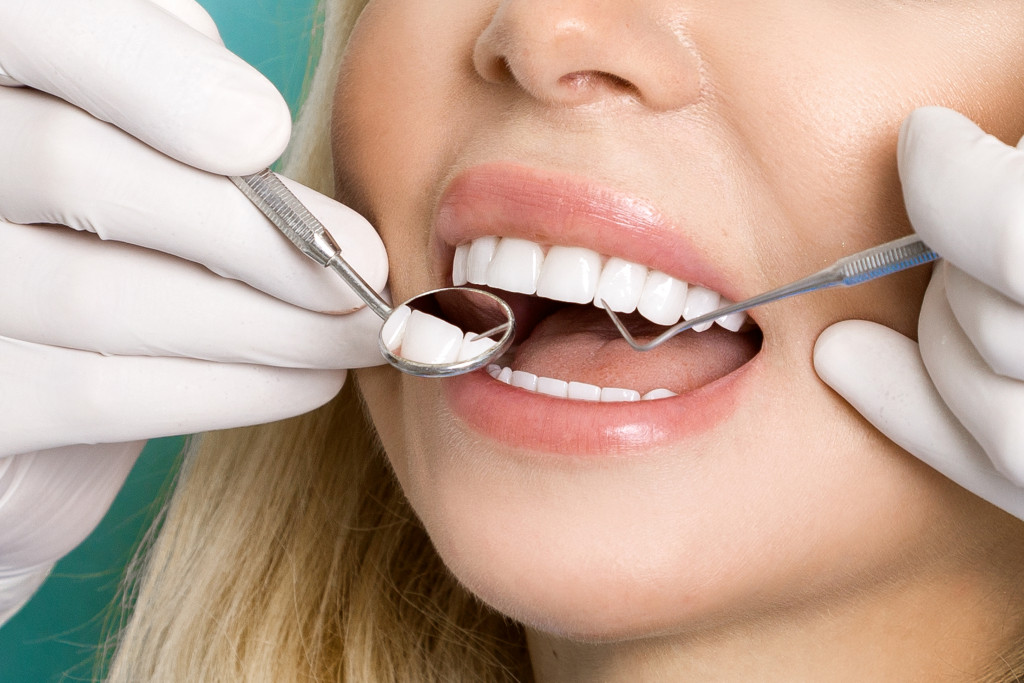- To maintain good oral health, it is important to visit the dentist regularly and practice preventative measures.
- Treatment for tooth decay depends on the severity of deterioration and range from dental fillings to extractions.
- Eating a balanced diet low in sugar and drinking plenty of water helps prevent gum disease.
- Avoiding heavy alcohol consumption and smoking can help reduce your risk for developing bruxism.
Good dental health is important for many reasons. Not only does a healthy mouth contribute to a beautiful smile, but it also helps to prevent bad breath, tooth decay, and other oral health issues. Good oral hygiene habits can also help keep the body healthy by preventing systemic infections that can be caused by bacteria in the mouth.
The American Dental Association estimates that approximately 100 million Americans do not visit the dentist regularly, and this number is only increasing. With a lack of proper oral health care, many people suffer various dental problems. In fact, over 91% of adults between the ages of 20 and 64 have some form of periodontal disease.
That’s why it is important to understand what these common dental problems are, as well as the possible treatment options for each one of them.
Tooth decay (cavities)
One of the most common dental problems is tooth decay, also known as cavities. Cavities occur when bacteria in your mouth break down enamel on the surface of your teeth, which can lead to pain and sensitivity.
Prevention and treatment
To prevent cavities from forming, be sure to brush twice a day with fluoride toothpaste. When it comes to treating tooth decay, the goal is to stop the decay from getting worse and restoring the tooth to its original healthy state. The type of treatment needed will depend on the severity of the decay. Treatments include dental fillings, sealants, root canal therapy, and extraction.

Gum disease (gingivitis and periodontitis)
Gingivitis and periodontitis are two forms of gum disease that can cause serious damage to the gums and jawbone if left untreated. Periodontitis is the more advanced form of gum disease that causes pockets to form between the gums and teeth where bacteria can build up. This can lead to tooth loss, receding gums, bone loss around teeth, or even abscesses in severe cases.
Prevention and treatment
The best way to prevent gum disease is by flossing daily, eating a balanced diet low in sugar, avoiding tobacco products, and drinking plenty of water throughout the day. Treatment for periodontitis often involves deep cleanings (scaling) beneath the gumline to remove plaque buildup as well as surgery (osseous surgery) if needed. In addition to scaling and osseous surgery, your dentist may recommend antibiotics or antimicrobials to help reduce inflammation or treat any underlying infection in the mouth.
Tooth sensitivity (dentin hypersensitivity)
Another common issue is tooth sensitivity—a condition in which a person experiences pain or discomfort when consuming hot, cold, sweet, or acidic foods and drinks.
The condition can become especially painful if left untreated for too long as it can lead to increased cavities and decay. This is because as the enamel wears away, it exposes the softer dentin layer underneath which is more vulnerable to decay-causing bacteria. Additionally, as the enamel erodes away, tiny tubes in the dentin layer that contain nerve endings may become exposed leading to further pain and sensitivity.
Prevention and treatment
In order to prevent tooth sensitivity from developing or worsening there are several things you can do, such as using a soft bristled toothbrush and not brushing too aggressively, using desensitizing toothpaste, avoiding acidic foods and beverages, and avoiding bleaching treatments that could damage your enamel. Your dentist may also use bonding material to cover exposed parts of a tooth or fill cavities, which can provide relief from sensitivity issues.
Teeth grinding (bruxism)
Bruxism is a common dental issue that affects millions of people worldwide. It involves the grinding and clenching of teeth, usually during sleep. This can cause serious damage to the teeth and jaw, leading to pain, tooth sensitivity, and even jaw misalignment.
The primary cause of bruxism is still unknown. However, there are some theories that suggest that certain lifestyle factors and medical conditions may be linked to it. Habits such as heavy alcohol consumption can increase a person’s risk for developing bruxism. Additionally, certain medications such as antidepressants can lead to excessive jaw tension which can result in teeth grinding.
Prevention and treatment
It is important to be aware of common lifestyle factors that increase the risk of developing bruxism, such as smoking, heavy alcohol consumption, or use of certain recreational drugs. If these activities cannot be avoided, it is recommended to take steps to manage them responsibly in order to protect your teeth and jaw from damage.
Using an anterior night guard while sleeping can help reduce the risk of teeth grinding by providing a protective barrier between the upper and lower teeth. Anterior night guards come in different sizes and shapes based on individual need so be sure to consult with your dentist before purchasing one.

Overall, having good oral health is essential for overall well-being. Common dental problems such as tooth decay, gum disease, tooth sensitivity, and teeth grinding can all be prevented or treated with the right approach. Practicing proper hygiene habits such as brushing twice a day with fluoride toothpaste and flossing daily are important steps to help prevent these issues from developing in the first place. If you experience any of these common dental problems, it’s best to consult your dentist as soon as possible so that they can provide an appropriate treatment plan tailored to your needs.






